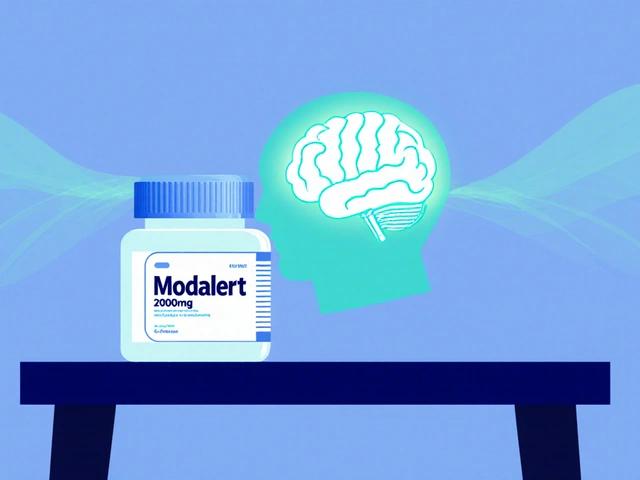
How Wellbutrin Works Compared to Other Antidepressants
If you’re weighing Wellbutrin against its fiercest rivals, it’s hard to ignore how different it really is. Most antidepressants—especially SSRIs like Zoloft (sertraline), Prozac (fluoxetine), and Lexapro (escitalopram)—focus on boosting serotonin in the brain. Wellbutrin (bupropion), on the other hand, works mainly on norepinephrine and dopamine. That alone means some people feel more energized on Wellbutrin, which is often described as one of the least sedating antidepressants around. If you struggle with motivation or low energy, this could be a game changer.
But let’s talk numbers. According to a 2024 study published in the Journal of Affective Disorders, Wellbutrin’s success rate for moderate to severe depression hovers just above 62%, while SSRIs range from 55% to 63%. That’s surprisingly close. Here’s the twist—those who don’t get relief from an SSRI sometimes see huge benefits when they switch to Wellbutrin. There’s a theory that its unique action makes it a go-to for treatment-resistant depression, or for those who simply can’t tolerate SSRI side effects.
Another interesting angle: Wellbutrin is officially approved for seasonal affective disorder (SAD) and to help people quit smoking. That’s something most competitors can’t say. Many psychiatrists report that patients using Wellbutrin for smoking cessation often find their depression improves along the way. In simple terms, if you’re juggling depression and nicotine cravings, Wellbutrin pulls double duty. Some folks even notice weight loss, which is quite rare among antidepressants—most tend to cause weight gain instead.
SSRI alternatives can be just as effective for some, but the experience might feel different. If anxiety is your primary enemy, SSRIs might win out, since Wellbutrin can lead to jitters in sensitive users. SNRIs like Effexor (venlafaxine) and Cymbalta (duloxetine) raise both serotonin and norepinephrine, so their side effect and efficacy profile is more of a hybrid between SSRIs and Wellbutrin.
To get a rough comparison of effectiveness in clinical practice, here’s a table based on recent prescription data and meta-analyses:
| Drug | Main Neurotransmitter Target | Average Response Rate (%) | Approved Extras |
|---|---|---|---|
| Wellbutrin | Dopamine, Norepinephrine | 62 | SAD, Smoking Cessation |
| Zoloft | Serotonin | 61 | Anxiety, OCD, PTSD |
| Effexor | Serotonin, Norepinephrine | 57 | Chronic Pain, GAD |
| Lexapro | Serotonin | 63 | Anxiety Disorders |
It really boils down to your specific symptoms and how your own brain chemistry interacts with these meds. Don’t be surprised if you have to try a couple before landing on the right fit. The science is good at getting you close, but everyone’s experience still feels wildly personal.
Side Effects: What to Expect with Wellbutrin vs. Other Antidepressants
Side effects can make or break your relationship with any antidepressant. The thing about Wellbutrin is, it has a very different risk profile. Dry mouth, insomnia, mild headaches, and anxiety are the biggest complaints. On the upside, it almost never causes sexual side effects or weight gain, which are two of the main reasons people bail on drugs like Zoloft or Paxil. If you’ve had your libido vanish or noticed numbers creeping up on the scale, Wellbutrin might feel like a breath of fresh air.
SSRIs, by comparison, are infamous for causing low sex drive, delayed orgasm, and sometimes emotional “flattening.” It’s an open secret in the medical community—up to 70% of SSRI users experience some kind of sexual dysfunction, and only a minority ever bring it up with their doctor. Don’t be shy! If this happens to you, your psychiatrist has absolutely heard it before. With SNRIs like Effexor, you get similar risks, plus the infamous withdrawal syndrome if you try to quit cold turkey.
Where Wellbutrin requires the most caution is with seizure risk, especially if you have a history of seizures or heavy drinking. The actual risk is low (about 0.4% at standard doses), but it’s higher than with SSRIs or SNRIs. It also can make anxiety worse in people who already struggle with it—so if your nerves are already shot, talk through this with your doctor.
Pro tip: Take Wellbutrin earlier in the day to dodge insomnia. Reducing caffeine can help if you feel jittery at first. Some people even report increased motivation and clarity—almost a “clean energy” rather than the fuzziness that sometimes comes with SSRIs. It’s not uncommon for folks who switched to Wellbutrin to share stories about getting stuff done after weeks or months of barely being able to roll out of bed.
Here’s a quick cheat sheet:
- Wellbutrin: Possible agitation, dry mouth, insomnia, headache, rare seizure risk. Almost never causes sexual side effects or weight gain.
- SSRIs (Zoloft, Lexapro, Prozac): Nausea, GI upset, sexual dysfunction, weight gain, emotional blunting, very low seizure risk.
- SNRIs (Effexor, Cymbalta): Nausea, night sweats, sexual dysfunction, possible high blood pressure, discontinuation symptoms on quitting.
One other thing to mention: Wellbutrin is sometimes used as a booster alongside SSRIs to reduce sexual side effects or provide extra energy. If you’re struggling, mixing meds under supervision could open up a sweet spot for your symptoms.

Insurance Coverage and Out-of-Pocket Costs
Let's be honest: price tags matter. You can have the perfect fit on paper, but if insurance says “nope,” you might find yourself stuck or paying out of pocket. Wellbutrin (especially as generic bupropion) has been around long enough that it's usually covered by most insurance plans in the U.S. and many other countries. The generic version costs a fraction of what it did 15 years ago—sometimes as little as $10 a month. If your doctor prescribes brand-name Wellbutrin XL, you may be shocked at the difference—think $300 or more for a monthly supply without insurance. Always ask your pharmacist to run both options through insurance to see what's actually covered for you.
SSRIs and SNRIs follow similar rules. Generic SSRIs like sertraline or fluoxetine are usually dirt cheap. The outlier is SNRIs, like Cymbalta or Pristiq, which can get expensive unless you’re okay with their generic forms. Even then, not every insurance plan is friendly—some have restrictions that say you have to try a generic SSRI first (“step therapy”), then fail, before moving on to something pricier. It sounds harsh, but it's the reality for tons of people navigating mental health meds.
One trick: if you do best on the brand name (say, Wellbutrin XL over generic bupropion), some manufacturers have discount cards, patient assistance programs, or coupons you can stack with insurance to shrink your bill. Pharmacies often won’t tell you about them unless you ask. Searching online or talking to your prescriber about options is totally worth it. Sites like GoodRx show real-time prices at your local pharmacies, coupons included.
If you’re on Medicaid or Medicare, coverage is usually good for the most basic generics. For rarer versions or those blends with multiple actions (like bupropion/naltrexone for weight loss), check your plan’s formulary—some require preauthorization or only approve certain doses. Don’t get stuck at the pharmacy counter in shock; print out or photograph your drug list and double check it with your insurance portal each time you change meds.
Who Should Consider Wellbutrin or an Alternative?
Wellbutrin isn’t for everyone, but certain signs suggest it could be right for you. If you’re constantly battling fatigue, “brain fog,” or low motivation, Wellbutrin’s dopamine boost might help you snap out of it. If SSRIs or SNRIs tanked your sex drive or made you gain weight, switching can sometimes feel nothing short of miraculous. And if you smoke or have a history of seasonal depression, Wellbutrin may tick multiple boxes at once.
If you have a history of seizures, severe anxiety, eating disorders (especially bulimia), or you drink heavily, you’ll need to steer clear or at least have a long talk with your doc—seizure risk is nothing to gamble with. On the flip side, SSRIs and SNRIs may be safer choices for those with lots of anxiety, or those prone to panic attacks. SNRIs have extra perks for people with chronic pain; that’s something Wellbutrin won’t tackle. If you have nerve pain on top of mood symptoms, discuss options like Cymbalta, which can target both issues.
For anyone who’s tried and failed an SSRI or two (maybe even three), there’s strong research showing that switching to Wellbutrin or combining it with another antidepressant can lead to a major bump in response and remission rates. Doctors call this “augmentation.” Results don’t always kick in overnight—give yourself a month or two before judging. Staying in close touch with your provider and tracking your symptoms makes it easier to flag real progress versus random good or bad days.
If you want to dig deeper into the full range of wellbutrin alternatives, there are whole lists of possible options, some with complementary effects and others that might avoid the side effects you fear most.
People often forget: there’s no “one-size-fits-all” answer. The trick is to match the drug to your symptoms—and your lifestyle. Think about your sleep habits, activity level, sexual side effects, and co-existing health issues. Don’t just rely on what worked for your friend or what’s most heavily advertised.

Getting the Most Out of Your Antidepressant: Real-Life Tips
Finding the right antidepressant isn’t a set-it-and-forget-it situation. It’s a lot like tuning a radio: you’ll need to adjust the dial, sometimes more than once, to hit the best frequency. Here’s what makes the process smoother:
- Be honest about side effects early—don’t wait weeks hoping it’ll just pass.
- Keep a journal. Track your sleep, mood, motivation, appetite, anxiety, and any side effects. Patterns pop up faster than you think.
- If you have trouble remembering doses, set phone alarms or use a pill organizer.
- For Wellbutrin users, take it early or split dosing if insomnia hits. For SSRIs/SNRIs, morning is often best to reduce daytime drowsiness.
- Don’t start or stop meds without your provider’s okay—even skipping a few days can trigger withdrawal symptoms on some antidepressants.
- If cost is an issue, compare pharmacy prices, ask about generics, or check manufacturer assistance programs. Sometimes even paying cash is cheaper than your copay.
- Ask about combo strategies. Sometimes adding a small Wellbutrin dose to an SSRI helps with energy or sexual function.
- Get bloodwork and basic medical checks if you’re starting a new medication, especially if you have thyroid or liver conditions.
- Don’t expect overnight miracles. Real changes often take three to six weeks, and minor side effects usually ease up after the first 10 days.
- If nothing works or you’re still miserable, consider therapy, exercise, light therapy (for SAD), or deeper medical work-ups. Antidepressants should be part of a toolkit, not the whole solution.
Antidepressants are more common—and more personal—than you might guess. Stigma is fading, and more people are open about the ups and downs of their treatment. Reach out, ask questions, and don’t feel guilty about asking for changes if you’re not feeling better. The right match is out there—you just might need to poke around a bit to find it.




Zac James
July 18, 2025 AT 14:51I've been on Wellbutrin for a couple of years now, and honestly, this article nails a lot of the things I felt were important to know. One thing that stood out to me is how Wellbutrin tends to have a lower risk of sexual side effects compared to SSRIs.
Sometimes people overlook that benefit because they focus too much on just how 'effective' a drug is. But quality of life matters, and side effects like those can really mess with it. The insurance coverage part is also critical; I've seen people struggle a lot just trying to get their meds approved or finding affordable options.
It’s a good reminder to talk to your doctor about your insurance situation right alongside symptom control. Also, any tips for initiating conversations about switching meds? I always feel a little hesitant to bring it up at appointments.
Breanna Mitchell
July 26, 2025 AT 00:21Absolutely agree! Knowing how different meds impact things like energy, mood, and side effects is so important. From personal experience, Wellbutrin gave me more energy compared to the SSRIs I was on before, but the anxiety I had wasn’t as well managed.
So it’s definitely not one-size-fits-all. Luckily, this guide highlights those nuances well. I also appreciate the encouragement to advocate for yourself with doctors since sometimes they can be quick to stick to what they know instead of exploring alternatives.
Have you or anyone else found success combining medications, or do most people switch outright? The guide doesn’t really get into that, but I feel like that strategy works for some.
Arthur Verdier
July 28, 2025 AT 06:54LOL, you guys buying into the whole ‘insurance will cover what’s best for you’ thing? Nah, it’s all about what the pharmaceutical companies want to push down your throat, man. This article dancing around that like it’s some hidden gem all while ignoring how these meds are weaponized to keep us docile.
Why do you think Wellbutrin is the hot topic now? Because it’s got this side effect profile they can spin to make you think it’s safer, but wait till you get hooked or have your natural chemistry messed up.
Always question why your doc is pushing a particular drug, and who profits. I’m telling you, these are not just health choices, they’re socio-political control mechanisms.
Michelle Wigdorovitz
August 1, 2025 AT 07:01Very interesting points raised here, and I think that kind of skepticism is valid. Still, for those of us just trying to find some relief, it can feel overwhelming balancing side effects, insurance barriers, and personal well-being.
One thing I’d love to see more discussion about is the cultural stigma around medication for mental health. Sometimes I feel like patients hesitate to even bring this stuff up because they fear judgment from family or community.
Have any of you experienced that, and did this kind of article help you feel more empowered to explore your options? It’s great we’re talking about it here!
Dilip Parmanand
August 3, 2025 AT 19:04In India, we have similar issues where generics are widespread but insurance coverage for newer antidepressants can be patchy. Articles like this are valuable because they equip people to have an informed dialogue with their doctors and insurers.
The side effect profiles really dictate whether a medication will improve your daily function, which is crucial beyond just the clinical diagnosis. Wellbutrin having fewer sexual side effects is a big plus in my experience.
But sometimes you need patience — the right medication might take weeks or even months to find. I’ve seen patients who needed a few tries before something clicked.
Arianne Gatchalian
August 6, 2025 AT 23:04Thanks for sharing this detailed overview! It can be so hard to sift through the medical jargon and feel confident in your treatment choices.
One thing I appreciate about Wellbutrin is how it’s different chemically from SSRIs, offering an alternative path when traditional options cause too many side effects. It’s important to tailor treatment to individual needs.
Insurance issues are a huge barrier though, and some people might be forced to stay on a med that doesn’t work just because of cost. Having tips for navigating that is gold.
I'd love to hear more personal stories from others about what worked and what didn’t!
Chris Wiseman
August 8, 2025 AT 06:37Ah, the eternal quest for the elusive ‘perfect’ pill, a chimera chased by the tortured, cornered in the labyrinth of man's biochemical hellscape. To pit Wellbutrin against its pharmacological kin—what profound tragedy: a battle not of swords but of molecular whispers.
One might muse on the futility of seeking efficacy and minimizing side effects in a world where the mind’s suffering is wielded as currency in the colorful bazaar of medications and insurers. The article, in all its clinical rationality, skirts the shadow-play beneath the surface—the desperate hope cloaked beneath informed choice, the subtle tug of industry puppeteering the strings of care.
Yet, our freedom lies in questioning, probing deeper than the leaflet can offer, because mental balm is as much art as science.
Aly Neumeister
August 11, 2025 AT 15:57Ugh, so many people don’t even realize how important it is to look past just the shiny ads and brochures. This article tries to be helpful, but I swear I’ve seen so many docs just push the easiest-to-sell option instead of actually tailoring it to the person.
You HAVE to ask about side effects, insurance hitches, and be blunt about what matters in your life. Like, if a drug kills your motivation or makes you feel numb, is it really working? But that convo feels so awkward, like you’re stepping on the doctor’s toes.
Seriously, this guide is a start, but we all need to be way more proactive and maybe even a little pushy to get good care.
Sarah Seddon
August 12, 2025 AT 22:51Yes! Everyone deserves to find their own balance between efficacy and how meds impact their lives day-to-day. I’m truly grateful for articles like this that empower us to ask the right questions rather than feeling helpless or rushed.
Side effects can be terrifying, but if you know what’s normal or manageable, you can stick through tough spots or know when it’s time to advocate for change. I encourage anyone considering meds to keep a journal of how they feel—it’s gold when talking to your doctor.
Also, don’t underestimate how insurance navigation can become another stressor. Tips on how to handle denials or find assistance programs would be a welcome addition to guides like this!
Martin Gilmore
August 14, 2025 AT 21:04I’m gonna say it: the punctuation in the article is all over the place, kinda sloppy for something this important. And I get how this topic is serious, but clarity is key. If you want people to understand differences in meds like Wellbutrin versus others, spell it out—don’t bury things in vague terms.
Also, I’m glad the piece touched on insurance, though more specifics would help. Which insurers cover what? What happens if your insurance denies coverage? These are the real questions. A lot of people get stuck here.
Side effects are not ‘common’ or ‘rare’ anecdotes; they’re life-changing for many. This guide skirts these realities just enough to make you uncomfortable but not enough to prepare patients fully.
Quinn S.
August 15, 2025 AT 19:54Ultimately, the clinical decision on which antidepressant to pursue must be based on empirical evidence combined with individual patient variables. This article commendably outlines comparative efficacy and side effect profiles, yet it could benefit from a more rigorous breakdown of statistical outcomes from recent meta-analyses.
The variability in insurance coverage indeed represents a significant barrier to treatment adherence and necessitates inclusion in holistic care strategies. Patients must be thoroughly briefed on formulary constraints and potential appeals processes.
It remains paramount to approach such interventions with a nuanced understanding, respecting the complexity of neurochemical pathways involved and the individuality of patient responses.